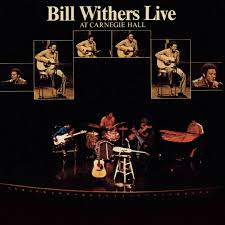
Be Sure to Wear Flowers in Your Hair
Published on Jan 19, 2026
WALK OUT TO WINTER: falling in love with—and to—Aztec Camera's High Land, Hard Rain
Published on Dec 26, 2025
First Anniversary
Published on Dec 17, 2025
Introducing: The IHTOV Zine
Published on Dec 15, 2025
More Liner Notes…
Featured Essay: The Needle and the Memory: How a Cracked Record Saved My Family Thanksgiving
by Kaylee Dunson

Every Thanksgiving in my house used to sound like a kind of chaos only love could make sense of pots clanging in the kitchen, cousins yelling over each other about football, the smell of collard greens and cinnamon, and my father humming off-key to whatever soul record was spinning in the corner. Usually, it was Bill Withers. Always Bill Withers.
He had this one record Bill Withers: Live at Carnegie Hall that he treated like a holy text. It lived in its sleeve like a relic, tucked behind his whiskey glasses and old love letters from my mother. When he played it, he’d lower the needle with this reverence, like he was bowing to something sacred.
But the year everything fell apart, the year my parents stopped speaking, the year my brother moved out without saying goodbye, the year the laughter in our house turned to the sound of doors closing, Thanksgiving came anyway. It always does.
The table was smaller that year, not because there were fewer seats, but because no one could quite fill the silence. My mother cooked because she didn’t know what else to do with her hands. My father poured himself a drink because he didn’t know what else to do with his heart.
I was home from college, old enough to understand what was happening but too young to know how to fix it. The house, once alive with soul and seasoning, felt like a photograph of itself flat, frozen, pretending.
Then, almost by instinct, I went to the corner shelf and pulled out the record.
It had been cracked for years. A hairline fracture across Side B that made “Lean on Me” skip every few seconds, as if Bill himself were stuttering through the ache. My dad used to joke that it gave the song “character.” My mom used to roll her eyes. Now, she just stood at the sink, silent, her hands in soapy water.
I wiped the dust from the sleeve, slid the record out, and placed it on the turntable. The needle dropped with a small hiss a tiny storm before the song.
And then:
That voice.
That warmth.
That quiet power.
When “Use Me” came on, my father looked up. His mouth twitched like he wanted to smile but wasn’t sure if he was allowed to. My mother turned, a dish towel in her hand, and leaned against the counter. For a moment, nobody said anything. The music filled the spaces where the words used to be.
Then came “Lean on Me.” The crack made the record skip every few beats just enough to break the rhythm, just enough to remind us it wasn’t perfect. But still, it played. And in that imperfection, something softened.
Halfway through the song, my father did something I’ll never forget. He got up, walked to the turntable, and adjusted the needle not to fix it, but to help it keep going. The skip was still there, but the song flowed smoother, steadier. My mother sat down.
They didn’t talk that night. But they didn’t leave the room, either.
I remember sitting there, cross-legged on the living room floor, watching the record spin, hearing the scratch of time itself. I thought about how many times that same record had soundtracked our lives: the birthdays, the breakups, the mornings when my dad made pancakes and danced barefoot in his robe. The grooves of that vinyl held more of us than any photo album ever could.
And I realized something: that record wasn’t broken. It was surviving. Just like us.
Over the next few hours, the house began to thaw. My mom started humming along. My father offered her a glass of wine, and she didn’t refuse. My brother texted from wherever he was, asking if we were still eating at seven. It wasn’t forgiveness exactly not yet but it was music. It was motionless.
When the record ended, no one rushed to turn it off. The needle lifted itself, hovered for a second, then clicked back into silence. My father poured another drink. My mother sat beside him. And I, still sitting on the floor, felt the strange, quiet gratitude that comes from realizing that love doesn’t disappear when it breaks, it just learns how to skip and keep playing.
Every Thanksgiving since then, no matter where we are or what we’re arguing about, we play that record. The same crack, the same skip, the same song that refuses to stop.
Last year, when my father passed away, I found that record again while helping my mom clean out the house. The sleeve was worn soft at the edges, the way paper gets when it’s been handled by love. I put it on my own turntable back home, and when “Lean on Me” skipped the same way it always did, I felt this wave of memory crash through my kitchen lights, laughter, grief, forgiveness all stitched together by sound.
It’s funny how vinyl works. It doesn’t erase the damage. It carries it. Every scratch, every crack, every imperfect groove tells the story of what it survived. And when you play it, you don’t just hear the music you hear the years that made it.
That’s what Thanksgiving feels like now. Not perfect. Not easy. But I’m still playing.
And every time that record spins, I’m reminded that maybe love isn’t the absence of cracks, it’s the decision to keep the music going anyway.
Kaylee Dunson is a writer, with a focus on deeply human, evidence-based storytelling.

